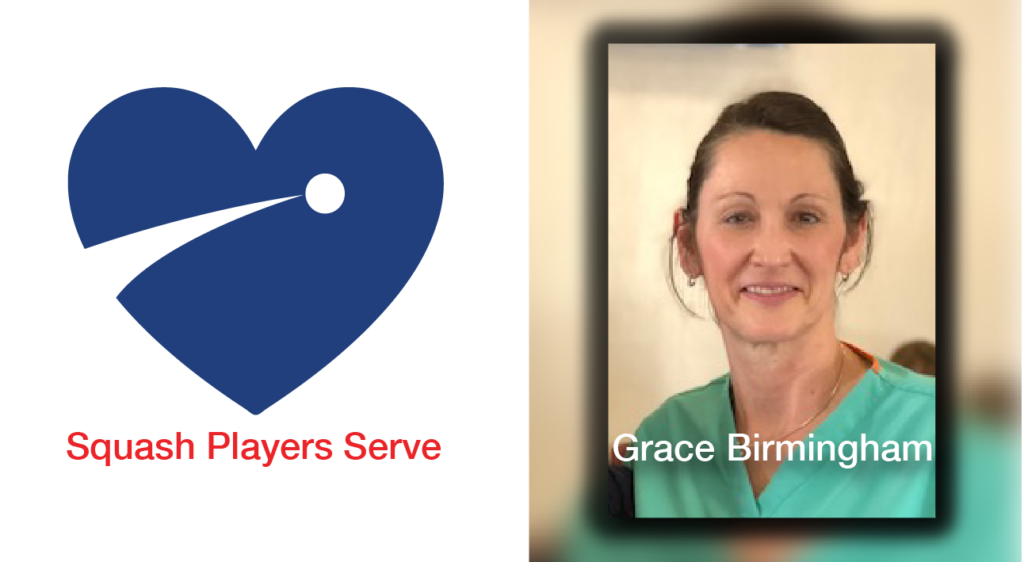
Squash players around the country are doing their part to help during this time, and US Squash will recognize these champions each week in an ongoing “Squash Players Serve” series. Submit a short video or story or tag us @USSquash on Instagram, Twitter or Facebook, to share your stories of squash players supporting the community during the pandemic.
The U.S. medical community are continually adapting and preparing for what’s next during the ongoing pandemic. Grace Birmingham, a certified nurse who serves as the Director of Surgical Services at University Hospital and Medical Center in Tamarac, Florida, offered a glimpse at how at smaller facility is meeting the challenge.
Birmingham has been based in Florida since 2006 and manages the operating rooms in the small community hospital located in Broward County, just north of Miami. Like the rest of the country, Broward County and University Hospital were forced to adapt to an influx of COVID-19 cases in recent months. While most cases in southern Florida were centered in the Miami-Dade county, University Hospital experienced a wave of positive patients in-house and in the Intensive Care Unit.
“Anybody who is in healthcare and has hands-on contact with patients has been in an incredibly stressful position,” Birmingham said. “For my colleagues it’s been far more stressful because they’ve been in the rooms with these patients and they don’t know if the patients are positive or negative. So what are they bringing home to their family? It was quite a steep learning curve for all of us and that was heightened by all of the panic across the country. How do we deal with our patients and protect ourselves? We’re fortunate that we never had any shortages of PPE, but we did have to be very smart about distribution. It was a bit unnerving at first, but this is what we signed up for as nurses and as professionals in patient care.”
Like all hospitals throughout the country, day-to-day protocol has completely changed due to the pandemic. In Florida, non-essential surgeries were postponed and out-patient care were restricted to essential procedures. Birmingham is currently preparing for a major influx of elective procedures in the coming weeks as Florida’s regulations shift.
“There’s been an underlying thread of anxiety in all of us,” Birmingham said. “Lots of meetings, lots of planning, lots of what ifs. It took all of us out of our comfort zone. No longer were we able to joke around with our patients without masks on. We all wash our hands frequently obviously, but now doing it three or four times more often every day. We have to talk to people through masks to allay their fears, which can be difficult. It really caused us to dig deep. I’ve been so fortunate everyone here have been collegial and our administration has been supportive of us. Patients can often make or break your day, but they’ve all been extremely gracious and it’s been a nice reminder of why I went into this profession to begin with. I don’t get to be where I am unless I have these wonderful nurses and techs working for me, and they’re the ones who are on the front lines, I’m just a step removed. I feel for my staff. I’m trying to give them all the information I have and be as transparent as possible.”
Birmingham had always been an avid racquet sports player and picked up squash nearly thirty years ago at the Decathlon Club in Santa Clara, California. Birmingham as been an avid and regular player ever since, competing in numerous U.S. Women’s Team Nationals Championships (Howe Cup) and National Singles. Birmingham even won a national title, the women’s 40+ in 2000 and was honored with the 2002 Feron’s Wedgwood Sportsmanship Trophy. Birmingham currently plays at Life Time Boca Raton, and while she looks forward to returning to the courts, urges the squash community to use caution and take preventative measures when courts are deemed appropriate to open by local government officials.
“I want people to think straight and act smart,” Birmingham said. “I don’t want people to be afraid to go out of their houses or go to the gym. They just need to be smart and follow directives of local officials. The squash community has a fabulous camaraderie, we’re a tightly-knit group. If you’re going back to playing squash, somebody who’s symptomatic isn’t going to be able to play obviously, but we need to be cautious of anyone who could be asymptomatic and follow club protocols. Wash your hands, be sensitive about what you touch and mind your distance. This isn’t going away, it could come back during flu season. I just hope that people can try to get back to this new normal that we’re facing, whatever that is. And people like Dr. Deb Phippard can hopefully find a vaccine and treatment to help all of us.”
State and local governments around country are developing various phases of reopening with a wide range of timelines. Resumption of activity will vary by location and type of facility, and all plans must be evaluated in concert with local, county, state and federal guidance. US Squash recently released preliminary return-to-play guidelines to help facilities navigate the challenges of reopening.












